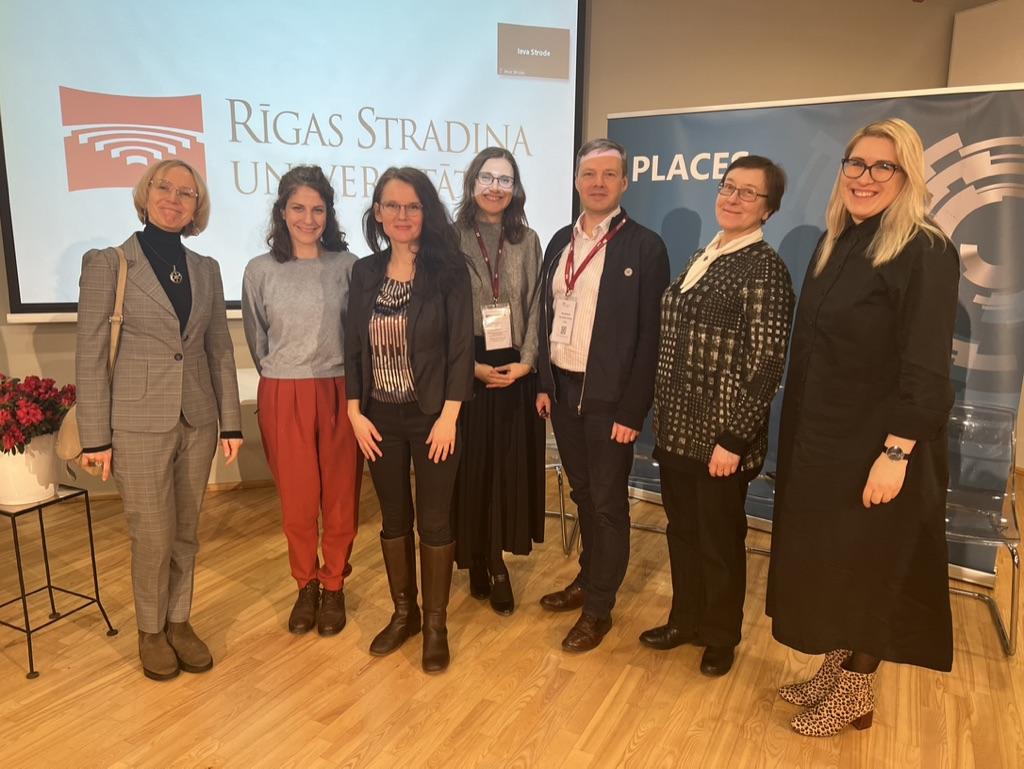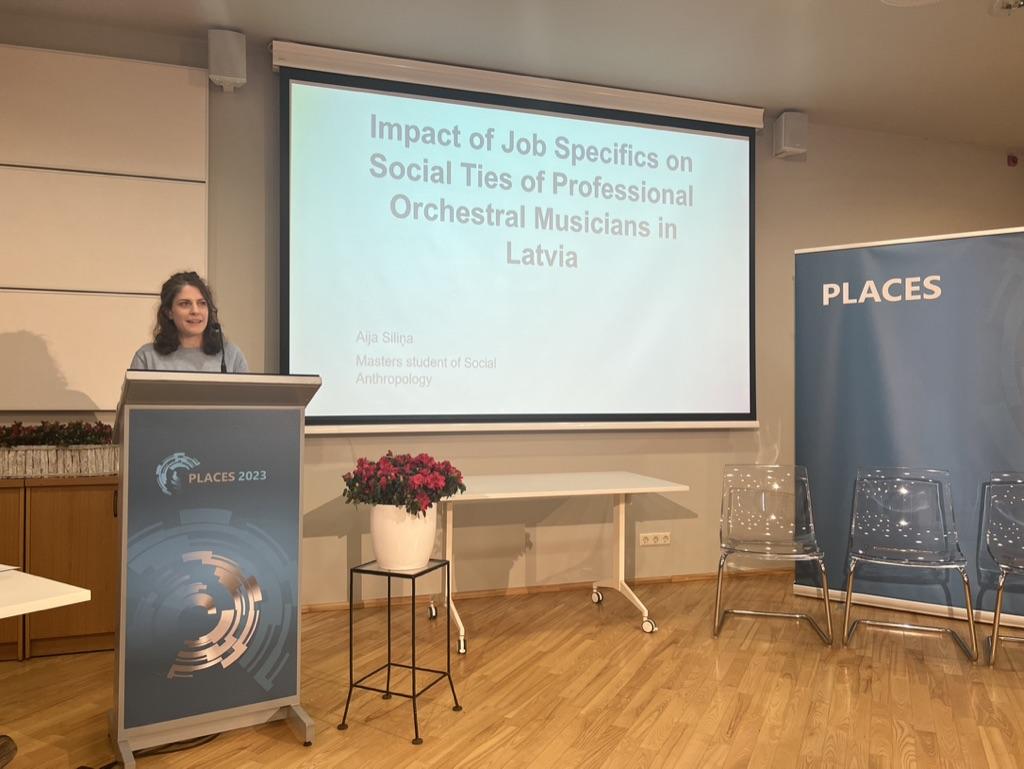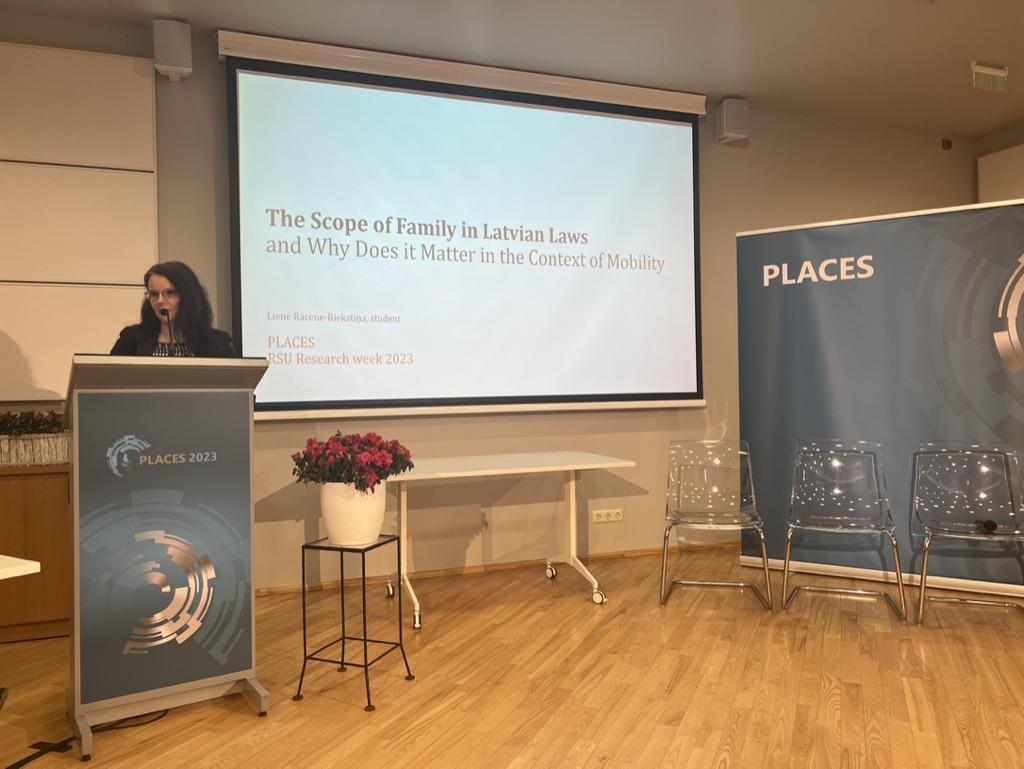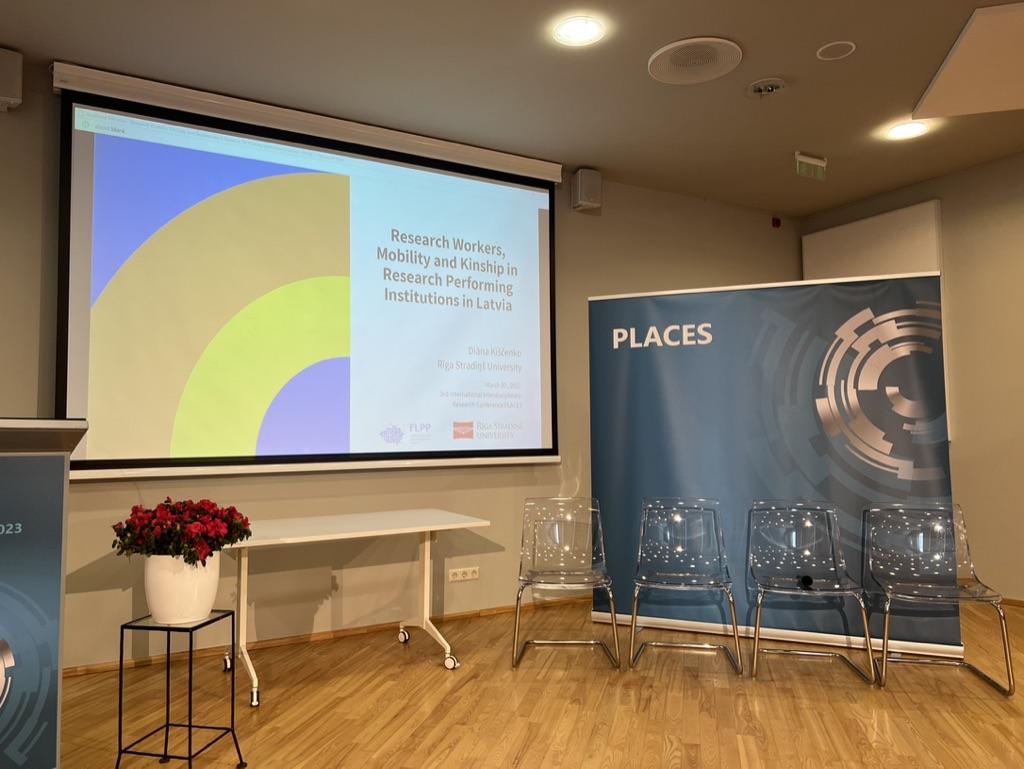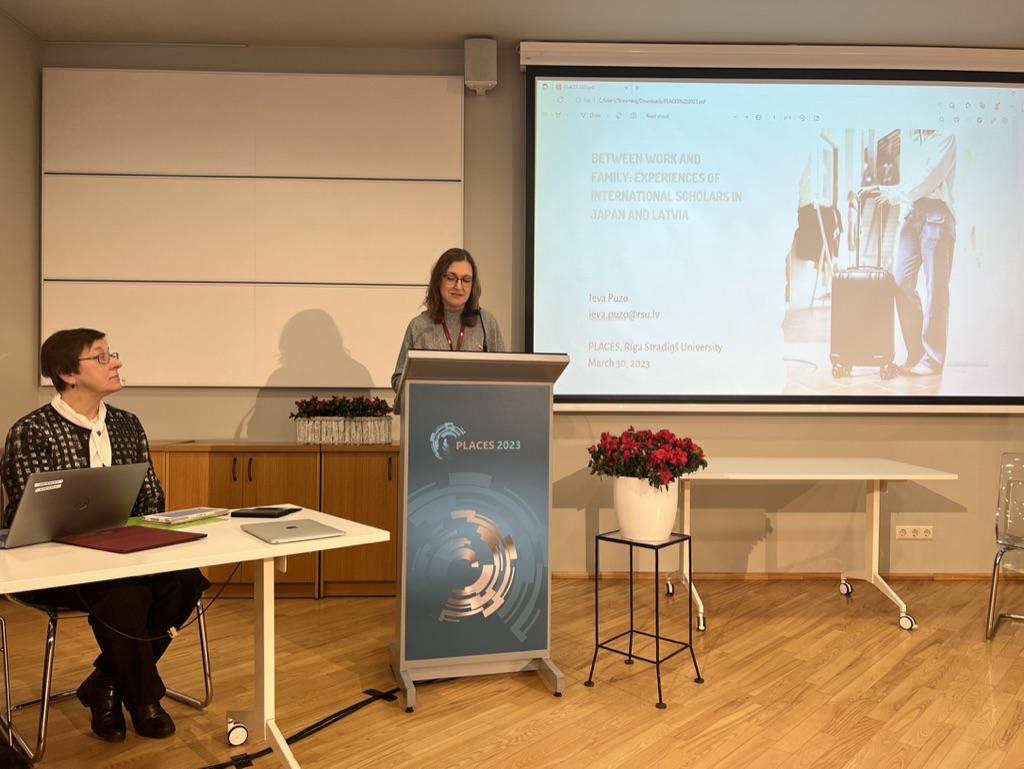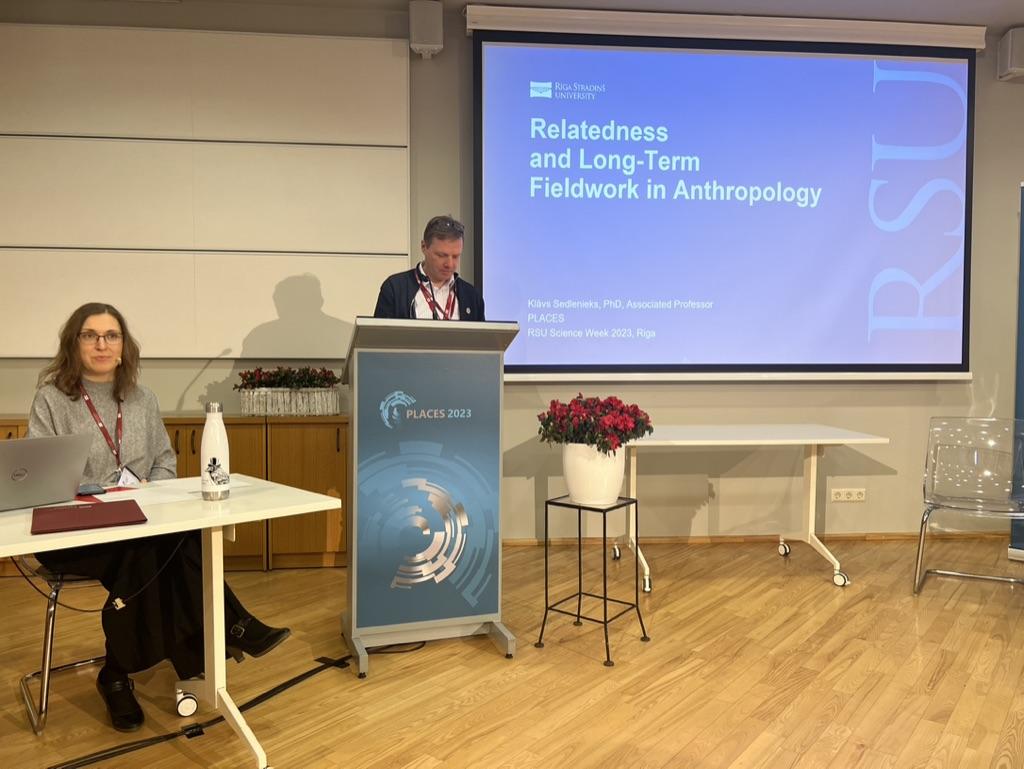RSU notika konference par darba mobilitātes un radniecības/ tuvniecības mijiedarbību
2023. gada 29.–30. martā Rīgas Stradiņa universitātē norisinājās 3. starptautiskā konference PLACES, kuras ietvaros sociālantropologi īstenoja vienas dienas konference par darba mobilitātes un radniecības/ tuvniecības mijiedarbību.
Konferencē ar prezentācijām uzstājās FLPP projekta Attiecības kustībā: tuvniecība mūsdienu mobilajos darba režīmos pētnieki. Vadošais pētnieks Klāvs Sedlenieks dalījās savos novērojumos par ilgstoša lauka darba pieredzes un tuvniecības mijiedarbību. Tikmēr vecākā pētniece Ieva Puzo savā prezentācijā sniedza atziņas par zinātnieku mobilitāti un radniecību Japānā un Latvijā. Doktora grāda pretendente Diāna Kiščenko prezentācijā dalījās savās atziņas par to, vai un kā Latvijas zinātnes universitāšu ilgtermiņa stratēģijās (ne)tiek pievērsta uzmanība zinātnieku mobilitātei un tuvniecībai. Konferencē uzstājās arī divas sociālantropoloģijas maģistrantūras studentes un projekta pētnieces. Studente Liene Rācene-Riekstiņa sniedza ieskatu savā maģistra darba pētījumā par ģimenes jēdzienu Latvijas likumos un tā nozīmi mobilitātes kontekstā. Aija Siliņa prezentēja savu pētījumu par darba specifikas ietekmi uz profesionālo orķestra mūziķu sociālajām saitēm Latvijā.
- Tēzes
Relatedness and the Long-Term Fieldwork in Anthropology
Klāvs Sedlenieks
Objectives
Since the dawn of cotemporary anthropology long term fieldwork has been treated as both initiation rite for an aspiring anthropologist and as a necessary methodological tool to do proper ethnographic analysis. However, while kinship and relatedness of the research subjects has been central in anthropological agenda, almost no attention has been paid to the ties of the researcher herself. In this presentation I argue that long-term fieldwork is more often than not antagonistic to relatedness-linked human ties in the personal and academic lives of the anthropologist.Materials and Methods
The presentation is part of an on-going research and is based on series of in-depth (primarily online) interviews with antrhropologists across the globe.Results
Interviews demonstrate that it is not always easy to reconsile fieldwork with personal life. Most fieldworkers enter their long-term fieldwork projects alone while their partners stay at home. This is often detremental for relationships. Another consequence of this is that the long-term fielwork is adjusted to the life-stage of the anthropologist - one does proper long-term fieldwork while young and single while in later stages this seems to be impossible or unnecessary. This in turn has also unintended methodological consequences where research is done on the basis of more short-term tripsConclusions
1. The aspect of researcher’s personal kin ties should be integrated in curriculum of teaching anthropological method in order to prepare the researchers better for this “rite of passage” 2. Methodological consequences of the life-stages and long-term fieldworks should be theoretically explored.(this presentation is part of the side-event “Kinship and Relatedness”Between Work and Family: Experiences of International Scholars in Japan and Latvia
Ieva Puzo
Objectives
In this presentation, I examine the tension between two contradictory factors shaping the (im)mobility of research workers. On the one hand, scholars face the demands of the dominant regimes of knowledge production, which increasingly prioritize short-term employment contracts and expect researchers to move across borders from one position and institution to another. On the other hand, many scholars struggle to balance their work and personal lives and consider the building and maintenance of close relationships important.Materials and Methods
Semi-structured interviews with international scholars in Japan and Latvia as well as other ethnographic data.Results
I suggest that researchers consider personal relationships and kin ties an important factor when making decisions about their potential employment locales. As the narratives of my interlocutors reveal, researchers often make decisions to move to or, importantly, remain in places significant to their family members—and places that may enable the creation of new kin ties or the maintenance of already established ones.Conclusions
The findings described in the paper destabilize the oft-accepted assumptions about the “ideal” research career path and “desirable” locales of knowledge production, highlighting the importance of family-focused rationales when it comes to making decisions about one’s work life.Research Workers, Mobility and Relatedness in Research Performing Institutions in Latvia
Diāna Kiščenko
One of the first words that pops-up in the strategic documents of higher education institutions in Latvia is “excellence”. Institutions are striving for excellence in education and research. According Appelt et al. (2015), one of the main tools to ensure excellence in the academic world is to foster mobility – both across border and between institutions. But how does this pursuit of excellence, which includes idea of mobility as a driving mechanism, intersects with the lives of research workers and their important relationships (partners, children etc.)?
In this paper, I look at development strategy and gender equality policy documents of four research performing institutions in Latvia - Rīga Stradiņš University, University of Latvia, Riga Technical University, and Latvia University of Life Sciences and Technology. By analysing these documents, I try to understand, if and how kin ties and needs of research workers have been complied with the institutional striving for excellence, which might include semi-permanent periodic work mobility.
The analysis of strategics documents of four research performing institutions show that, on the one hand, organizations recognize the importance of mobility; on the other hand, there are no institutionalized support mechanisms regarding family life and other kin-maintaining responsibilities in the case of mobility. This contrasts with the other areas of work (diplomatic and military services), where are instruments to support the relocation of employees and their spouse and children in the case of mobility. Secondly, although the gender equality policy documents recognize the importance of work-life balance, the support instruments are mainly focused on immobile employees and mostly are related to their children (access to childcare at the premises of the institution, additional paid vacation days, leisure activities etc.).
Scope of Family in Latvian Laws and why It Matters in the Context of Mobility
Liene Rācene-Riekstiņa
Objectives
Firstly my intention is to demonstrate that the scope of legal norms is blurred and contrary to what is imagined does not provide an exact answer to the question what is a family in Latvia. Secondly I want to emphasize possible collisions which may occur in the context of mobility because of conservative scope of the existing legal system in Latvia which is built around and viewed through the lens of the nuclear family.Materials and Methods
This research is based on a content analysis of legal texts.Results
According to the oldest and some most recent legal acts the family in Latvia in the narrow sense of its definition is nuclear family - a heterosexual spouses and their children while they are still a part of a common household, but other legal acts use a broader scope of the family the boundaries of which are blurred. Sometimes the scope of the concept of family is clarified by naming each member of family, but at other times it is left open, and it can be replaced by synonyms such as close person (tuvinieks), relatives and household, and narrowly also by the institution of marriage, unless these synonyms are used in a different context that excludes their use as synonyms.Conclusions
The conservative leading scope of the concept of family constructed by state and secure in laws creates challenges for Latvia as a host country, because in some cases people who are recognized as family in they home country will not be family in LatviaImpact of Job Specifics on Social Ties of Professional Orchestral Musicians in Latvia
Aija Siliņa
Objectives
Orchestral music performance creates an environment which consists of multi-directional social interactions. The relationships between the artist and the audience, among the musicians on stage, between the musicians and their music instruments. But this is only a part of networks that surround the lives of a professional orchestral musician. The other side, more personal - family, friends, colleagues - form a collective of relationships that both impact and are influenced by the musician’s work.Materials and Methods
In this paper, I aim to examine the work experience of orchestral musicians in Latvia and how it affects their personal relationships and family life. Are there aspects of this profession that challenge family and friendship ties? If so, are these reasons specific to this type of work and are they influenced by education and employment system that orchestral musicians go through in Latvia?Results
Currently collected data, through semi-structured interviews, show that majority of respondents have several other jobs besides their work in orchestra. The main reason for seeking additional work was irregular and inefficient income. Another impact on their personal lives was the work schedule that is not constant and often clashes with working hours of family members and friends who don’t work in this field. Important to note that all of the interviewed musicians had either studied or worked abroad at some time in their careers, or are still currently doing so. The reasons varied – for most, holding concerts or touring abroad is a recurring part of the job; studying to experience different modes of education; moving abroad to seek more opportunities and gain experience. These different movements were also mentioned as having a disruptive effect on relationships depending on duration and distance.Conclusions
Thus these irregularities, uncertainties and constant movements can create disturbance in maintaining stable social connections in family and friendship circles.
Saistītās ziņas
 Endovaskulārā transvenozā femoropopliteālā šuntēšana. Vai varam aizmirst par vaļēju kāju artēriju šuntēšanu?RSU zinātnes sinapses, Pētniecība
Endovaskulārā transvenozā femoropopliteālā šuntēšana. Vai varam aizmirst par vaļēju kāju artēriju šuntēšanu?RSU zinātnes sinapses, Pētniecība
